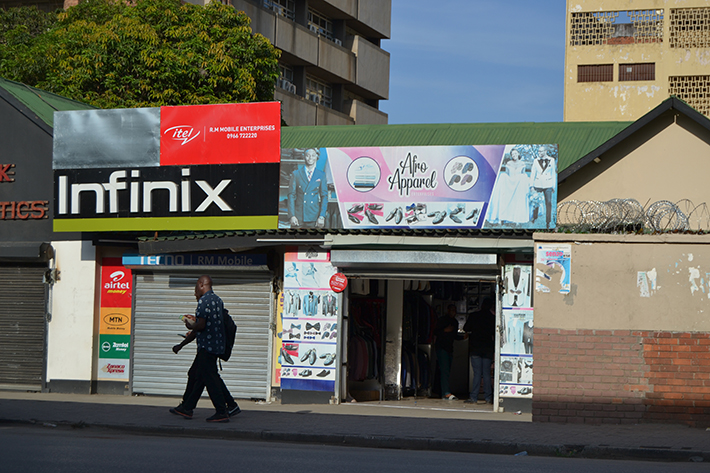A Source of Success

Smooth access to Chinese products enables Zambia’s small- and medium-sized enterprises (SMEs) to grow their business.
Every two to three months, Garry Mwitwa leaves his hometown of Kafue and boards a plane bound for China to buy tens of thousands of dollars worth of electronics on every trip.
Proficient in Chinese and able to bargain with Chinese wholesalers in Beijing, Mwitwa, 35, is a symbol of the booming goods imports from China. The young entrepreneur often carries wads of cash to buy used Chinese-made phones and accessories to sell back home.
“If you want to be successful in life and realise your dream, you must be in charge of your own destiny and try to be physically present in each and every place to get the necessary exposure,” Mwitwa told ChinAfrica, while carefully placing hundreds of items of Chinese electronics on the shelves of his store.
Mwitwa, who owns an electronics retail outlet in Kafue Town, 40 km south of Zambia’s capital Lusaka, has been travelling to China since 2015.
Likewise, Anita Namfukwe, proprietor of Nams Fashions nestled in Lusaka’s central business district, is also upbeat about her business as the stylish and affordable Chinese garments are well sought after by local consumers.
“Yes, my business is doing fine, because whenever I order my goods from China, I can get a good profit margin compared to buying from Malaysia, and that’s why I choose the Chinese market. In addition, the demand for Chinese-made garments is high,” Namfukwe said. She plans to expand her business by opening another outlet in the city’s bustling Comesa Market, after having ordered $5,000 worth of women’s garments.
Market appeal
With its vast manufacturing industry and competitive product offerings, China has become a lucrative destination for most Zambian small- and medium-sized enterprises (SMEs) looking to expand their business in the international trading space.
Arguably, Zambian traders favour the Chinese market because of the diversity of products that are readily available at affordable prices. From electronics to clothing and footwear, a wide range of Chinese goods has found a ready market in the Southern African country.

Some of the SMEs based at Lusaka’s Kamwala Market revealed that getting goods from China is a seamless process – one that enables them to not only take care of their families, but also create local employment. Others who order their merchandise via online platforms such as Alibaba say they have cultivated good relationships with the Chinese suppliers who are not only honest but also consistent and efficient.
Underscoring the importance of the Chinese market, Zambian President Hakainde Hichilema recently led the largest-ever delegation since he took office to China on a state visit at the invitation of his Chinese counterpart President Xi Jinping from 10 to 16 September.
During the visit, President Xi and President Hichilema upgraded the relationship between Zambia and China to a comprehensive strategic and cooperative partnership.
A pivotal moment during the visit was the signing of more than 15 memoranda of understanding (MoUs) covering various sectors of the Zambian economy, which gives expression to the shared vision for cooperation and partnership in areas such as finance, trade, agriculture, media, and tourism. These agreements opened up new opportunities for Zambian commodity importers and exporters, further strengthening economic ties.
Considering the country’s peaceful environment and favourable business policies, President Hichilema invited several companies engaged in the manufacturing of electric vehicles and smartphones to encourage them to expand their operations to Zambia.
As a result, telecom equipment maker ZTE plans to open a smartphone plant in Zambia, following an MoU to construct the factory.
“Our last engagement in Shenzhen was at ZTE, a leading global ICT solutions provider. This will be a game changer that brings many jobs, as we increase digital solutions to citizens through our e-government division,” President Hichilema said. “We encouraged them to consider opportunities in Zambia for digital platforms, as we push to transform our country into a modern economy through tech advancement.”
The Zambian head of state affirmed that this comes after realising the need to swiftly develop Zambia’s digital space, as part of his administration’s smart economic transformation plan. He reiterated that the agreements would help Zambia to become fully digital, which will benefit everyone, particularly rural communities.

New chapter
Meanwhile, Chinese Ambassador to Zambia Du Xiaohui said the two countries were writing a new chapter in their “all-weather” ties.
“The two heads of state jointly drew up a new blueprint for the development of China-Zambia relations, which will have a lasting and far-reaching impact on bilateral relations,” the Chinese envoy stated.
Along with the sales of popular smartphones, the Chinese brands such as Tecno, Itel and Infinix are also fostering the growth of Zambian smartphone retailers and accessories suppliers, thus helping to build the economy.
Across Zambia, city and town centres are brimming with brightly coloured advertisements for Chinese smartphones as scores of new retailers are springing up to meet the burgeoning demand.
Webby Kunda’s shop on Lusaka’s Chachacha Road displays a wide range of, mostly, Chinese brands.
“I started selling smartphones in 2016. Back then, I struggled to sell even one handset per day; but thanks to the arrival of so many Chinese smartphones with advanced features and good prices, things have changed,” Kunda noted.
In this context, smartphone retailers and accessories suppliers like Mwitwa are elated over the ZTE’s MoU. Once ZTE sets base in Zambia, his business will certainly flourish as he will be able to order his goods locally, thereby saving the import duties and time needed to ship the goods from China.
“This is great news for us electronics dealers, as it will not only revamp our business growth, but also create direct and indirect jobs, especially among the young people countrywide,” Mwitwa added.
 Facebook
Facebook
 Twitter
Twitter
 Linkedin
Linkedin
 Google +
Google +










